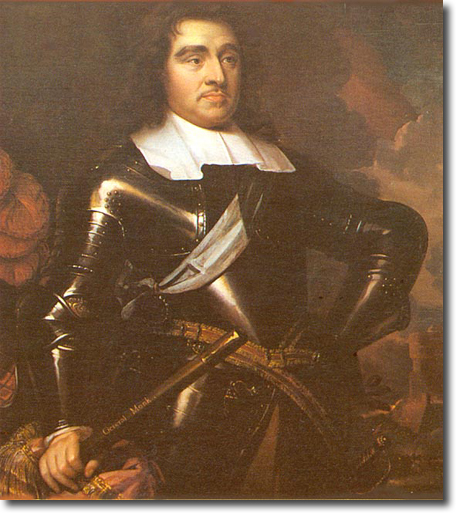|
|

 |
| Monck, sometimes spelled Monk, was born in Great Potheridge, Devon on 6th Dec 1608. His first military experience lasted 9 years, serving the Dutch in the Netherlands against Spain. Then in 1642/3 he suppressed a rebellion in Ireland just before returning to England to fight for the King in the Civil War. Unfortunately he was captured at Nantwich in January 1644 and imprisoned for two years in the Tower of London.
After the defeat of the King's army somehow Monck was employed by the other side. He was put in charge of an army sent to Ireland to put down another rebellion but with limited success. Despite this Cromwell gave him his own regiment. At first he was offered the regiment that had captured him in the Civil War but they did not want each other. In the end two regiments were stripped of 6 companies each to make up what eventually became the Coldstream Guards. They were sent straight away to deal with the Scottish Royalists at Dunbar which was a victory for Cromwell. Monck also proved himself as a sailor as well as a soldier. He played a leading part in three English naval victories in the First Dutch War. Then in 1654 he again fought against Scots Royalists in the highlands and remained as governor. After Oliver Cromwell's death he at first continued his support of the son, Richard Cromwell but did not oppose the overthrow of the Protectorate. The Rump of the Long Parliament was recalled but dissolved forcefully by Maj-General John Lambert. Monck took control of the situation. He restored the Rump, was made Captain General, and went up against Lambert with an army from Scotland. Monck was now a Royalist again so that when Parliament was dissolved in March 1660 he was heavily involved in bringing Charles back to England and the throne. The King rewarded him by making him Duke of Albemarle and a Knight of the Garter. He was also created Master of the Horse and Lord Lieutenant of Ireland. The Second Dutch War (1665-67) saw him in command of the English fleet again. He died in London on 3rd Jan 1670 and was buried in Westminster Abbey on 29th April. |
Armed Forces | Art and Culture | Articles | Biographies | Colonies | Discussion | Glossary | Home | Library | Links | Map Room | Sources and Media | Science and Technology | Search | Student Zone | Timelines | TV & Film | Wargames